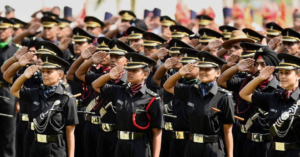After a long and excruciating battle to bring equality in the army regarding the differences in the nature of employment among men and women, the center has finally implemented the verdict of the Hon’ble Supreme Court to grant permanent commission to women officers in the Army.
The verdict was given by the bench comprising Justices DY Chandrachud, Indu Malhotra, and Indira Banerjee during the hearing of another case being represented by senior advocate R Balasubramanian who was a lawyer for the Centre in the matter. Justice DY Chandrachud has welcomed this decision by saying, “it is the victory of our nation that women aspire to achieve the highest pedestal.”

Women in the Army through the years:
While women have been a part of the army since 1992, there has been a considerable amount of differences in the way that they have been included when compared to the men. They were commissioned for a period of five years in certain chosen streams only, such as Army Education Corps, Corps of Signals, Intelligence Corps, and Corps of Engineers. Recruits under the Women Special Entry Scheme (WSES) had a shorter pre-commission training period than their male counterparts who were commissioned under the Short Service Commission (SSC) scheme.
In 2006, the SSC scheme was extended to women officers under which they were commissioned for a period of 10 years, extendable up to 14 years. But even then, there was absolutely no trace of equality between men and women. While male SSC officers could opt for permanent commission at the end of 10 years of service, this option was not available to women officers. They were kept out of any command appointment and could not qualify for a government pension, which starts only after 20 years of service as an officer.
Also, Read: Women are Not Capable of Being Left Free or Independent
The fight for equality started in 2003 when a PIL was filed before the Delhi High Court to grant Permanent Commission to the women officers. Finally, the Supreme Court has solidified the foundation of equality in the army for women after 17 years of back and forth. It had shot down the arguments made by the Centre that women are physiologically weaker sex than men and that they were being kept out of command posts because the largely rural rank and the file will have problems with women as commanding officers.
A small but significant step for women:
“To cast aspersions on the ability of women and their role and achievements in the army is an insult not only to women but also to the Indian Army,” the apex court had said. The judgment was delivered on the defense ministry’s petition challenging the 2010 Delhi high court verdict that ruled that SSC women officers in the army and IAF should be granted permanent commission on par with male SSC officers.

This decision has paved the way for a number of discussions that need to be had when it comes to gender equality. This win in women’s fight for equality in a male-dominated army has not only given more confidence to those women but has also provided wings to a lot of young girls who are determined to chase their dreams but one way or the another get stuck in the shackles of gender roles. This step might be small but it is undoubtedly a very significant one in the way that women are supposed to be treated in society.


